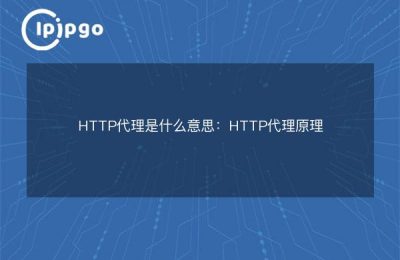
Mainland IP Proxy refers to the use of a proxy server to hide the user's real IP address and obtain a mainland IP address through the proxy server, thus realizing the goal of network access. Mainland IP proxy can help users to get more freedom on the network, solve the problem of access restriction in some specific regions, and also protect the privacy and security of users. Mainland IP proxy has a wide range of applications in web crawler, data collection, website acceleration and so on.
Why do you need a Mainland IP Proxy
Geo-restrictions are a common problem in the online world. Some websites or services may be geo-restricted according to the user's IP address, which prevents the user from accessing or using them normally. In addition, some websites may provide different content or services to users in certain regions, and users who want to access information in other regions need to use mainland IP proxies to simulate access from different regions.
For example, if we want to get the product information on an e-commerce website in mainland China, but due to geographical restrictions, we can't access the website directly. At this time, we can use the mainland IP proxy to obtain an IP address in mainland China, and then access the e-commerce site through the proxy server, you will be able to successfully obtain the required information.
ipipgothon
import requests
proxies = {
'http': 'http://内地IP地址:端口',
'https': 'http://内地IP地址:端口'
}
response = requests.get('Target site URL', proxies=proxies)
print(response.text)How Mainland IP Proxy Works
Mainland IP Proxy works mainly by forwarding user requests and responses through a proxy server. When a user initiates a network request, the request is first sent to the proxy server, which then sends the request to the target server with its own IP address and forwards the response to the user after receiving it. In this process, the proxy server plays the role of a middleman, making the communication between the user and the target server indirect, thus realizing the effect of hiding the user's real IP address.
In addition, Mainland IP Proxy has some advanced features, such as IP address disguise and encrypted data transmission. With these features, users can operate on the network more securely and also circumvent some network traffic monitoring and restrictions.
Application Scenarios of Mainland IP Proxy
Mainland IP proxies have a wide range of applications in various fields, and the following are some common application scenarios:
1. Data collection: Many data collection tasks need to simulate visits to different regions in order to obtain richer data. Mainland IP Proxy can help users to achieve this goal easily.
2. Web crawlers: When developing web crawlers, sometimes it is necessary to avoid being blocked by the target website's IP address. Mainland IP proxies can help the crawler program to rotate its IP address and reduce the risk of being blocked.
3. Domestic Access to Domestic Websites: Some domestic users need to access domestic websites or services, and mainland IP proxies can help them obtain IP addresses in mainland China for the purpose of accessing domestic websites.
4. Online advertising: Advertisers may need to test the effectiveness of advertisements in different regions, and the mainland IP agent can help them simulate the visits of users in different regions for effect testing and optimization.
concluding remarks
As a network proxy technology, Mainland IP Proxy has a wide range of uses in network applications. By hiding the user's real IP address, obtaining the IP address of a specific region, realizing the freedom of network access, and protecting the user's privacy and security, Mainland IP Proxy provides users with more choices and convenience. In the future, as the network environment continues to change, the mainland IP proxy technology will also continue to evolve, bringing users a better network experience.








